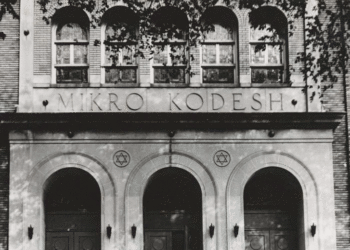Article in Orthodox newspaper compares local rabbi to a ‘pit bull refusing to release its quarry’
Agudath Israel of America recently launched a verbal attack on the Magen Tzedek project, which is poised to issue ethical certifications for kosher food products. The Magen Tzedek seals will be based on manufacturers meeting certain standards for the treatment of workers, animals and the environment.
The project has met with derision from some quarters of Orthodox Judaism. An article in Yated Ne’eman, an Orthodox newspaper, focused its screed on Rabbi Morris Allen, spiritual leader of Beth Jacob Congregation in Mendota Heights and project director for Magen Tzedek.
 Rabbi Morris Allen
Rabbi Morris Allen
In a statement issued May 3, Agudath Israel contended that the “goal” of Magen Tzedek “is nothing less than to redefine kashrut.” The statement concluded: “All of us who recognize the Divine nature of halacha, along with our established kashrut organizations, should regard the new seal for what it is, a falsification of the Jewish religious heritage, and treat it accordingly.”
Magen Tzedek representatives have responded that their initiative is not intended to supplant kashrut certification of food products, but is an attempt to ensure that kosher foods are produced in a manner consonant with Jewish ethical values.
In an opinion article for JTA, Rabbi Avi Shafran, director of public affairs for Agudath Israel, expanded the attack on Magen Tzedek to the Conservative stream of Judaism, which he says “pledges allegiance to halachah in theory but has, time and again in a variety of contexts, sought to ‘accommodate’ Jewish religious law to the mores and norms of contemporary American society.”
Shafran continued:
The “Whatever Tzedek” is simply the latest manifestation of Conservative leaders’ tradition of exchanging Divine mandates for contemporary constructs. Its seal is a trained one, and its neat trick isn’t balancing a ball on its nose but leading people to confuse kashrut with contemporary social issues.
The Magen Tzedek project is backed by the United Synagogue of Conservative Judaism, the umbrella group of Conservative shuls, and the Rabbinical Assembly, the organization of Conservative rabbis.
Also, Yated Ne’eman published an article titled “Magen Tzedek: The Sham Behind The Shield.” The author of the story, Debbie Maimon, zeroed in on Rabbi Allen, who is depicted as the agent behind a “full-throttled campaign by the labor unions to unionize Agriprocessors [the now-defunct kosher slaughterhouse in Postville, Iowa, run by the Rubashkin family].”
Here is more from Maimon’s intemperate article published in Yated:
The story of [Rabbi Allen’s] infiltration of the meat-packing plant, collaboration with the labor unions, and the relentless Rubashkin-bashing that catapulted him into media limelight and boosted his career, has yet to be told.
Like a pit bull refusing to release its quarry, Allen continues to slur both Agriprocessors and Sholom Rubashkin, proudly building his new “ethics” program on the ashes of the company he did so much to destroy.
Most recently he appeared on a national TV program,American Greed, with labor consultant and fellow opportunist Avram Lyons of New Jersey. Stringing together lies, fantasy and doctored up history, both men pitched the program’s message to millions of viewers, vilifying Sholom Rubashkin as an evil, greedy criminal who ruthlessly exploited poor immigrant workers.
More than 400 Agriprocessors workers were arrested in a massive immigration raid in May 2008. In November 2009, a federal jury convicted Rubashkin, 51, on 86 counts of bank fraud, money laundering and other charges. Rubashkin was sentenced to 27 years in prison and ordered to pay more than $26 million in restitution. It was recently reported that a panel of the Eighth Circuit Court of Appeals will hear arguments for a new trial for the former Agriprocessors manager. The hearing is scheduled for June 15 in St. Louis.
Magen Tzedek co-chairs Rabbi Michael Siegel and Gerald Kobell responded to the verbal attacks launched by Agudath Israel. Writing for JTA, Siegel and Kobell noted:
Magen Tzedek is not a kashrut certification and has never sought to be a kashrut certification. Rather it is an ethical certification program that is only available for food products already bearing a recognized hekhsher.
Far from replacing kashrut, Magen Tzedek will encourage those concerned with Jewish ethical principles to purchase kosher products. Kosher consumers will be assured that kosher-certified foods are prepared in a manner consistent with Jewish ethical values. A clear indication of success for Magen Tzedek would be an increase in the number of Jews keeping kosher.
The Magen Tzedek Commission has labored quietly and diligently for five years. We are now in the final beta-testing stages in creating the world’s first and only comprehensive Jewish ethical certification for kosher food. Our seal will uphold the biblical and rabbinic mandates regarding fair treatment of workers, humane treatment of animals and care of the earth.
Siegel and Kobell concluded their article with an invitation “to Rabbi Shafran and others” to join the Magen Tzedek project and help strengthen “the Jewish people through the promotion of the ethical production of kosher food and of kashrut observance itself.”
— Mordecai Specktor










 Rabbi Morris Allen
Rabbi Morris Allen










Two Jews, three opinions. That the Orthodox and the Conservative Jews disagree about Jewish law is not news. They both agree that Jews should keep kosher. They both agree that Jews should be ethical in business. Let’s work on getting along.
Let’s be clear. Magen Tzedek is about contemporary politics, not Judaism.